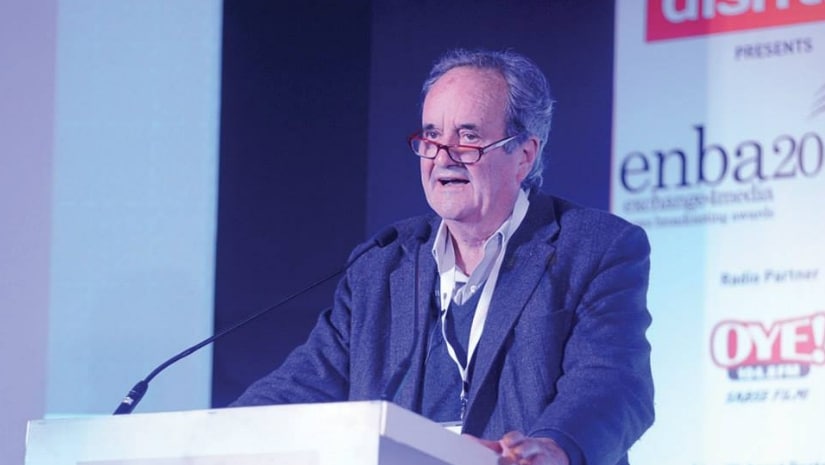Padma Bhushan awardee and recipient of the Red Ink Lifetime Achievement Award, Sir William Mark Tully, in a talk yesterday at Conclave — part of Malhar organised by Mumbai’s St Xavier’s College — spoke of India’s achievements and challenges as a democracy. “I think India has shown the world that it’s possible to be a developing country and have a democracy, and that is something to be hugely proud of,” he said at the talk, emphasising the country’s commitment to universal adult franchise. [caption id=“attachment_5517791” align=“alignnone” width=“825”]  Veteran journalist and author Mark Tully. Image via Facebook/ IMPACT Magazine[/caption] Tully explained that one of the things impinging on this progress is “the problem of governance,” adding that citizens seem aware of this when they attribute the smooth running of the country to being left “bhagwan ke bharose”. Tully’s talk emphasised particularly on various governmental institutions not having enough autonomy as they carry out specific functions, saying that “it is because of institutions that a democracy can function.” Each governmental institution — the Parliament, the executive, and the judiciary — suffers the problems of interference and a lack of autonomy, a symptom of which is corruption. Each branch must have sufficient power to maintain an overall balance for the smooth running of the country, much like a stool where all three legs must be equal. “I think a lot of the imbalances in India come from the common misapprehension that Parliament is sovereign… and the idea that politicians have that they, as members of Parliament, can do anything they want,” said Tully, about the prevailing ‘I can do anything I want’ attitude. This autonomy should be limited, with people realising that Parliament is not an absolute ruler, and the most important tool limiting this autonomy is the fundamental rights laid out in the Indian Constitution. The executives or civil servants, on the other hand, must be reformed to have greater autonomy, with reduced political interference. Tully explained that uncooperative officials are quickly transferred and silenced if they challenge local politicians, and that major reform is required so the institution can run smoothly with officials being able to do their job without pressure or interference from politicians. On the other hand, Tully explained that civil servants themselves must also partly be blamed for their passivity in letting politicians overpower them. “In India, though there are civil servants who are proud of their profession, this does not translate into what I would call ‘corporate ethos’.” He talked about how pride in one’s profession and country enables one to function within the institution and retain one’s autonomy. “One of the institutions I think which is most widely criticised and in some ways rightly, and where I believe the ethos has largely been lost, is the police,” says Tully, adding that this entire institution needs radical reform. The police seem to have inherited the institution of the British Raj, who, instead of being a serving police, are a governing police force, with “emphasis just on law and order and do not have the ethos of serving the public at all”. Tully then came to the local bureaucracy who he said is also a ruling, rather than serving, body, and maintain the British Raj attitude of ‘we are the rulers and anything we do for you is a gift from us’. “There is a collusion between the local level bureaucracy and the elite in far too many villages,” added Tully, about the ineffectual implementation of the legislative structure. Next, Tully broached the topic of the third institution, the judiciary, whose functioning is also hassled by government interference. Most importantly, the government should not have any say in the appointment of judges. “And you get what Mrs Gandhi called for, which is ‘committed’ judges, and that is the last thing you want.” An important example is the recent statement by CJI Ranjan Gogoi about the lack of the CBI’s autonomy in the face of political powers. “We should also very much,” said Tully, “blame the general public for asking the politicians to interfere on their behalf with the executive.” The answer to all this, according to Tully, is not solely reform of government. Though a strong government is important, “The idea that a strong government is necessarily good for governance is an erroneous idea.” In terms of governance, strong does not equal good, and stronger governments are often more prone to trample authority and intimidate civil servants. Next, Tully warned that reform and technology, while useful, cannot be the sole answers either. “Technology is only as good as the people who use it and the institutions in which it is used.” Finally, what Tully said one can do is to “go out, into rural areas, into slums, and discover for yourself what’s going wrong and make up your own ideas about this, and then decide whether there’s anything you can do.” One must be alive to the issues and have the conscious realisation that there is a need for improvement in governance. “Make this an important part of your life,” said Tully about the condition of India’s governance.
Sir Mark Tully talks about the problem of governance, with unequal power distribution and interference being the main issues to address.
Advertisement
End of Article


)

)
)
)
)
)
)
)
)



